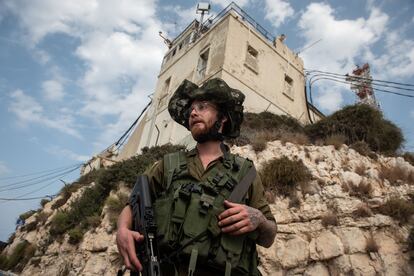Israel redoubles its guard in the north due to the risk of a Hezbollah offensive
The escalation of clashes along the border with Lebanon threatens to open a new front for the Israeli Army in the midst of an open war against Hamas


While the war against Hamas in Gaza is on track to become the bloodiest conflict in half a century in Israel, the escalation of clashes along the border with Lebanon is threatening to open a new front against the pro-Iranian Hezbollah militia. The extension of hostilities from south to north is no small risk. The Lebanese guerrilla, which was almost in a stalemate in the battle it fought in 2006 against the Israeli Army, has tens of thousands of militants hardened during a decade of war in Syria and more than 200,000 rockets aimed at the Jewish state.
“I’m not afraid. But we are on maximum alert and, over here, that is quite impressive,” says Corporal Tomer, 26, who declines to provide his last name, speaking in Spanish with a Buenos Aires accent — his family emigrated from Argentina to Israel more than three decades ago, and his grandmother taught him Spanish. This reservist was urgently mobilized along with 300,000 other young people last weekend, and on Tuesday he was standing guard at the old Rosh Hanikra border post. “No one comes to visit the sea caves anymore,” he said, standing in front of a mixed landscape of tourist attractions and barbed wire barricades. “This has become a military security zone. Yesterday [Monday] the echoes of the fighting could be heard a few kilometers away.”
At least six combatants died on Monday in the most serious incident recorded for 17 years along the Blue Line, the tense border that separates Lebanon from Israel under surveillance by U.N. peacekeepers. Two members of Palestinian Islamic Jihad, who were exiled in Lebanon and infiltrated into Israeli territory, were killed; so were an Israeli army officer who confronted them, and three Hezbollah militiamen in a retaliatory attack from Israeli helicopters.
The opposing sides have raised the casualty toll in the bloodiest day along the Lebanon-Israel border since the end of the war in the summer of 2006. The death count then after 33 days of combat was 1,300 Lebanese, mostly civilians, and 165 Israelis, almost all members of the military. When the guns fell silent, 10,800 soldiers from 40 countries were deployed to the border. The current commander of the Interim Nations Force for Lebanon (UNIFIL), the Spanish general Aroldo Lázaro, has now called on the opposing parties to exercise maximum restraint and coordinate with the U.N. contingent to prevent an escalation.
The border between Lebanon and Israel includes disputed areas, such as the so-called Shebaa Farms, valleys and cliffs that Israel has occupied for 56 years along with the Golan Heights in Syria. Hezbollah launched several rockets on Tuesday morning, and Israel responded by striking the launching positions of the projectiles, near the towns of Blida and Meiss al Jabal. The exchange of fire took place in the afternoon.
It is evident that Israel has amassed military personnel and resources at the old Rosh Hanikra border post. Observation drones monitor the airspace with their unmistakable hum, while Navy ships and patrol boats seal the maritime divide. The presence of the massive Merkava IV battle tanks, troop transportation vehicles and the deployment of reservist units clearly indicate that these are not simple military maneuvers.
“I graduated five years ago after almost three years of service as a military medic,” Tomer recalls. “Then I spent a year traveling through Latin America, and now I was finishing my nursing studies. But I belong to a combat unit and if they call me to defend my country I have to go wherever they call me. I could have been one of those attending the party held next to the Gaza border where Hamas carried out a massacre.”
Ghost towns
At his side, Gideon El Minerch, a 56-year-old truck driver born into a Jewish family that immigrated to Israel from Morocco, was distributing breaded meat sandwiches and cans of soft drinks to the soldiers at the old border post. “I’m too old to fight, but I help as a volunteer wherever I can. When I leave here, I will go with my truck loaded with vegetables to Eilat [on the coast of the Red Sea],” he says, admitting concern about having to cross one of the areas hardest hit by the rockets of the Gaza-based Islamic militias of Gaza, about 124 miles (200 kilometers) south of Rosh Hanikra.
The towns in northern Israel closest to the Lebanese border have become ghost towns. Residents are hiding inside their houses or near air raid shelters, if they do not have safe rooms in their homes. With classes suspended since Monday, many families with schoolchildren have moved in with relatives in the Tel Aviv metropolitan area.
While tensions continued to rise on the border between Israel and Lebanon, two countries that are still technically at war and do not recognize each other diplomatically, the American aircraft carrier USS Gerald R. Ford — the lead ship of her class — was sailing through the Eastern Mediterranean. A senior Pentagon official cited by Reuters has already warned Hezbollah not to make the “wrong decision” by opening a second front against Israel.
Sign up for our weekly newsletter to get more English-language news coverage from EL PAÍS USA Edition
Tu suscripción se está usando en otro dispositivo
¿Quieres añadir otro usuario a tu suscripción?
Si continúas leyendo en este dispositivo, no se podrá leer en el otro.
FlechaTu suscripción se está usando en otro dispositivo y solo puedes acceder a EL PAÍS desde un dispositivo a la vez.
Si quieres compartir tu cuenta, cambia tu suscripción a la modalidad Premium, así podrás añadir otro usuario. Cada uno accederá con su propia cuenta de email, lo que os permitirá personalizar vuestra experiencia en EL PAÍS.
¿Tienes una suscripción de empresa? Accede aquí para contratar más cuentas.
En el caso de no saber quién está usando tu cuenta, te recomendamos cambiar tu contraseña aquí.
Si decides continuar compartiendo tu cuenta, este mensaje se mostrará en tu dispositivo y en el de la otra persona que está usando tu cuenta de forma indefinida, afectando a tu experiencia de lectura. Puedes consultar aquí los términos y condiciones de la suscripción digital.








































